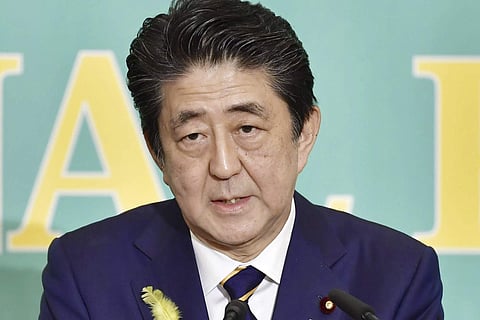

NEW DELHI: In his first stint as the prime minister for little over a year beginning 2006, Shinzo Abe set out a bold vision for a quantum leap in India-Japan ties largely based on the greater "confluence" of the two seas -- the Pacific and Indian Oceans.
By the time, Abe stepped down as the prime minister in 2020 ending his second stint at the top office after an eight-year tenure, the relations were in a much deeper trajectory encompassing cooperation in a wide range of areas with a broader aim of a free and open Indo-Pacific.
In a historic address to the Indian Parliament in August 2007, Abe elaborated on his ambitious roadmap for the India-Japan strategic ties to collectively deal with geopolitical challenges and for the overall prosperity of Asia.
"This partnership is an association in which we share fundamental values such as freedom, democracy, and the respect for basic human rights as well as strategic interests," Abe said.
"Japanese diplomacy is now promoting various concepts in a host of different areas so that a region called 'the Arc of Freedom and Prosperity' will be formed along the outer rim of the Eurasian continent. The Strategic Global Partnership of Japan and India is pivotal for such pursuits to be successful," he said.
The grandson of former prime minister Nobusuke Kishi, Abe believed a closer strategic partnership between India and Japan could be a game-changer for Asia as it could bring prosperity to the countries of the region.
The year 2013 was a significant year as it saw the first-ever visit of then Emperor Akihito and Empress Michiko to India.
The bilateral relations were upgraded to 'Special Strategic and Global Partnership' in 2014 and since then the ties saw a major upswing including in areas of civil-nuclear cooperation, maritime security, trade and defence and security.
In 2015, Modi, in a friendly gesture, hosted Abe for an iconic Ganga Aarti in Varanasi. Both the leaders offered prayers and witnessed the Ganga Aarti at Dashashwamedh Ghat.
In September 2017, Modi broke protocol to receive Abe at the Ahmedabad airport when the Japanese leader arrived for the 12th India-Japan annual summit.
Abe, his wife, and Modi also participated in an eight-km roadshow in an open jeep on their way to the Sabarmati Ashram to pay tributes to Mahatma Gandhi.
When Modi visited Japan in 2018, Abe hosted him at his ancestral home in Yamanashi, in first such reception accorded to a foreign leader.
Recently, when Modi travelled to Japan for the Quad summit, he met Abe, where they discussed the broad canvas of the India-Japan partnership.
The two countries now have multiple-level frameworks for engagements, including annual summits between the prime ministers, the annual foreign ministerial strategic dialogue, two-plus-two ministerial talks and NSA-level dialogue.
"Mr Abe made an immense contribution to elevating India-Japan relations to the level of a Special Strategic and Global Partnership. Today, whole India mourns with Japan and we stand in solidarity with our Japanese brothers and sisters in this difficult moment," Modi said following the news of Abe's death.
The 67-year-old Japanese leader died after being shot while giving a campaign speech in the southern Japanese city of Nara. He was rushed to a hospital after he was shot at the event. Hours later the hospital declared him dead.
Abe was prime minister of Japan from 2006 to 2007 and then again for a second stint from 2012 to 2020.